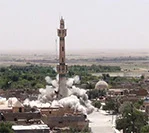LAST month, I attended a workshop on counter radicalisation in Kuala Lumpur, in which senior security experts, academics and officials from 27 countries participated.
This is not an area that is familiar to me. But with terrorism hitting the media practically every day, the workshop seemed a great opportunity to get up to speed on the theory and practice of radicalisation.
What I heard sent chills shooting down my spine.
The subject matter itself seemed straightforward and intuitive. What was disturbing was what I learned about radicals and the warning signs that they exist among us.
It eerily described what is hiding in plain sight, in this country. We see it every time we access a news portal or newspaper. We hear it so often from some of our politicians that it has become accepted and acceptable.
To begin with, most radicals are not violent. This is not because they are non-violent extremists -a contradiction in terms if ever there was one -but simply because they have made a conscious decision not to use violence.
Radicals are extremists who are not yet violent. Given the right circumstances, the subject of much study, they can and will be.
A society, therefore, harbours many more radicals than they have terrorists. Terrorists, those who cross the boundary into violence, are a small subset of a much larger population.
This idea is alarming. Leaders, neighbours, colleagues and even friends can be radicalised. The mere fact that they are not engaged in violent activities does not mean that they are not radicals.
Much-study has gone into exactly how radicals become violent extremists. This is known as the RVE process, and there are a number of theories about the stages involved.
One of the more accessible is a four-stage process that can be summarised as follows: one, “It’s not right”; two, “It’s not fair”; three, “It’s your fault”; and four, “You’re evil”.
It is at the fourth and last stage that violence -the war against “evil” -takes place.
Listening to political and community, leaders, it would seem that everyone is engaged in stage 3,also chillingly known as “target attribution”.
Target attribution has caused the loss of countless lives. It is preceded by a process of distancing and devaluation of the value of the target group.
The feeling that we are a lot further down the radicalisation path than we care to admit grew stronger when six attributes (or manifestations) of radicalised environments were shared.
One clear manifestation of radicalisation is an uncompromisingly legalistic interpretation of religion. Not all conservatives are radicals, of course, but radicals are widely known to be inflexibly doctrinaire.
Second, radicals are selectively ideological. They adhere to only one school of thought or religious authority. Everyone else who does not agree is a deviant or a proponent of an adulterated and inauthentic faith.
Third, there is extremely low tolerance of any kind of theological deviation. Those of other teachings or those who live different lifestyles need to be suppressed, banned, arrested and, as evident in the Middle East, killed.
Fourth, radicals simply do not accept diverse and plural societies. Living with those of other faiths and cultures is profoundly incompatible.
Fifth, radicals will attempt to impose their religious beliefs on others through whatever means, legal or illegal. The idea of individual liberties and choice is unjustifiable.
Sixth, and finally, is the politicisation of the radical agenda and even to the point of justifying the waging of war.
Do all of these sound too familiar? We may have not crossed the threshold into violence as yet but even a cursory glance at these six indicators would suggest that they are too-close-for-comfort in this country.
A society does not have to be violent in order to be radicalised. It only has to be closed and uncompromising, allowing simplistic monocausal interpretations of facts to breed and fester.
If we are dangerously advanced down this road, it says much for this country that there are Malaysians who are prepared to boldly speak up and act out.
In the final analysis, it is only this (fast-disappearing) middle ground that can prevent a national calamity and tragedy.
Article by Dato’ Steven Wong which appeared in New Straits Times, 28 April 2015.





